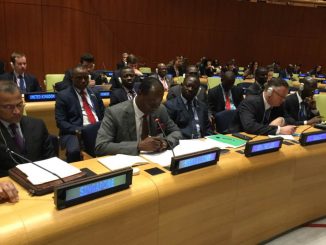Pa John Baimba Sesay-China :
On the 5th of Marc h, 2013, I was among dozens of diplomats that attended the First Session of the 12th National People’s Congress of the People’s Republic of china in the Great Hall of the People, where the Premier of the State Council, Wen Jiabao delivered a report on the work of the government. In his report, he gave a review of work in the past five years. He highlighted how, in the past five years they were able to build millions of government-subsidized housing units of various types and millions of housing units areas upgraded. In the Report On The Implementation Of Central And Local Government Budgets In 2012 And On Draft Central And Local Government Budget 2013, it was indicated, that , the country appropriation for guaranteeing adequate housing was 260.16 billion yuan, up by 44.6% and 122.9% of the budgeted figure…” This reason for this was as a result of an increase in subsidies for building government-subsidized housing “and supporting infrastructure in urban areas as well as renovating dilapidated rural houses…” This indicates development is something that goes with huge finance resources, no wonder, the efforts we keep making in Sierra Leone.
PA BAIMBA SESAY :
Sierra Leone is at the crossroad of her socio-economic development. From the framework of infrastructural development, we have been making great progress especially in the last five years of state governance by President Koroma. This is not to imply we have reached the apex of national development. However, explicitly from what we have been seeing, we are moving to that direction more so when we all decide to give our collective support the process of change and development. From roads, seaport, airport to social infrastructure, we have been making gains. The prosperity agenda is very specific in terms of government’s commitment to meeting the social needs of her people, especially that which deals with the need for delivering affordable housing for the citizenry. With specific reference to chapter five of the said document, it states, amongst other things, that one of the most basic needs of human existence is housing. In developed nations as in the West; the practical provision of house mortgages is assured. But for a developing nation like Sierra Leone, it may not sound as easy as it is in developed nations. This still remains a major challenge; given other set priorities of government, especially in her dream to not only meet the social needs of her people, but in also tackling other societal problems and governance challenges. The prosperity agenda takes into cognizant the fact that houses in the country are still provided through an intricate and protracted long-established processes of first buying land and erecting a building over many years that could last for years. That is not all. Government has therefore been thinking of the urgent need to rejuvenate the mortgage market to address this situation. We surely will reach there one day. Nassit has been doing some great job in providing housing.
Shelter Afrique, in line with the UN Millennium Development Goals, is working “with development partners, member states (and their agencies) and microfinance institutions on social housing initiatives that promote access to affordable housing and infrastructure services to low income groups. We particularly favour large-scale projects, which have government support (Public-Private Partnerships) and are environmentally sustainable (http://www.shelterafrique.org/
What is also encouraging in this initiative by the government, though the Ministry of Works and Infrastructure is the decision to get the local councils fully involved. The Third Schedule of the Local Government Act 2004 outlines the functions devolved to the local councils as a result of the creation of the of Act itself. Under the Ministry of Works the function of maintenance of council buildings/premises falls under the local councils. Bu the Minister of Works is going beyond that by promising that government will empower the councils to undertake the development of low cost housing schemes for their communities as his ministry has requested for the provision of some resources to both the Freetown City Council and the Western Rural District Council to initiate the construction of these units in partnership with the private sector. This is an impressive initiative and one that will definitely be in line with the common good of Sierra Leoneans, for which I would want to commend the Minister of Works, Alimamy Koroma
Also, the involvement of private local and foreign investments groups in our development drive is crucial and important as the very determination on the part of government to always provide the basic needs of the people. Their involvement has often been ensured by government through the provision of the enabling environment that will attracts not just local business entrepreneurs but also attracting resources and joint ventures from foreign business partners. In tandem with the desire on the part of the President to addressing the issue affordable housing in the country , it is well featured in the prosperity agenda, that government will also focus on attracting investment into this sector, will “continue to provide the necessary infrastructure, and mortgage insurance to first time home buyers and low-to middle income families.” Plans also are there, as stated in the prosperity agenda to “continue to encourage the use of local materials such as clay and other local building materials as a way of cutting down the cost of constructing homes.” Delivering affordable housing to our people will surely take them to prosperity. The time is now and thanks to Alimamy Petito Koroma for thinking big.





Leave a Reply